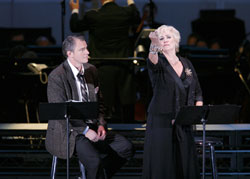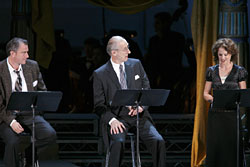

  |
|
|
||||||||||||||||||||||
|
FMS FEATURE... August 14, 2006 Sunset Blvd. Live at the Bowl Waxman centenary was ready for its closeup as best known film score hit the boards by Jon Burlingame  Photo: Mark W. Davis/Mathew Imaging The occasion at the Bowl marked the centenary of the birth of both director Billy Wilder (1906-2002) and composer Franz Waxman (1906-1967). The film was perhaps the greatest of their six collaborations: Sunset Blvd. (1950), whose four Oscars included one for each artist (Wilder for the screenplay, Waxman for his score).  Conductor John Mauceri gives the backstory on bringing the Sunset Blvd. film score and screenplay to the stage. Photo: Mark W. Davis/Mathew Imaging The event turned out to be a model of modern multi-media presentation in an outdoor venue: A 96-piece orchestra onstage; 27 actors participating in a semi-staged reading, script books in hand, with a few props to suggest the locales; and giant screens on either side of the Bowl, projecting (in classic-movie black-and-white) the faces and actions of the actors for the nearly 8,400 who attended. "This is a little bit like a radio show," Mauceri explained in his 10-minute introduction to the work, and his description couldn't have been more accurate. You could have turned your back to the screens and listened to the music and voices, or imagined yourself in the audience at a live radio drama (probably in a studio on Sunset Boulevard) in the 1940s. But in this 21st-century, image-driven world, it was impossible not to watch. On rare occasions when the music was especially critical – particularly during concertmaster Bruce Dukov's violin solos – one shifted one's glimpse to the Bowl stage to see an exuberant Mauceri and the musicians perform. As a theatrical experience, most observers agreed afterward, Sunset Blvd. was a complete success. Three Broadway veterans performed the key roles. Tony award-winner Betty Buckley, who played the delusional silent-film actress Norma Desmond in the London production of Andrew Lloyd Webber's musical adaptation of the film, repeated that role here, following in the legendary Hollywood footsteps of Gloria Swanson. Douglas Sills, perhaps best-known for the title role of Broadway's The Scarlet Pimpernel, held center stage as Joe Gillis, the William Holden part. Len Cariou, another Tony winner (for Sweeney Todd), played Max, the butler who is eventually revealed as a powerful silent-film director and one of Norma's husbands.  Douglas Sills as Joe Gillis and Betty Buckley as Norma Desmond. Photo: Mark W. Davis/Mathew Imaging  Sills as Joe Gillis, James Cromwell as Sheldrake and Jean Louisa Kelly as Betty Schaefer. Photo: Mark W. Davis/Mathew Imaging Lighting and sound effects were also critical in the show – from the strobe effects while Norma and Joe were watching her silent movies to the swimming-pool look projected behind the musicians as Gillis is murdered, and the police sirens that bookend the story. As for the Waxman score, film-music buffs were inevitably disappointed that the music itself did not have a more prominent role. But it must be remembered that the original purpose of the score was to support the drama so brilliantly written and directed by Wilder, and it did so again Sunday night. It was not so much a concert as a theatrical event incorporating music, acting and all of the other elements of a stage presentation. Musically speaking, it offered an opportunity to revisit a classic score. The key themes – Norma's off-kilter tango that suggests both her 1920s popularity and her increasingly demented mind; Joe's jazzy, nonchalant motif that conveys his breezy attitude; and the love theme for Joe and Betty, a clever transformation of Paramount's newsreel march "Eyes and Ears of the World" into a lyrical piece – were heard to greater effect than ever before. One would like to think that Franz Waxman would have been pleased. Certainly his son, John W. Waxman, who was present with many of the surviving Waxman family, was delighted. The mood was buoyant at the after-concert reception, attended by virtually all of the actors as well as Mauceri, Paramount executive Frank Mancuso and Varese Sarabande executive Robert Townson (who produced the 2002 re-recording of the score). Bowl Orchestra librarian Steve Biagini spent several weeks re-copying every single cue in the Sunset Blvd. score, to ensure that the players could easily read all of the notes. David Rambo adapted the Wilder-Charles Brackett-D.M. Marshman Jr. script for the stage, and Peter Hunt directed. ©2006 Jon Burlingame |
Search
Past Features
Feature Archives
|